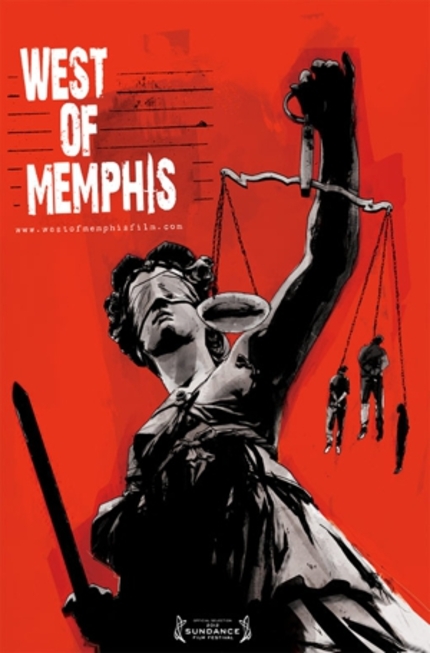Sundance 2012 Review: WEST OF MEMPHIS

Our sincere thanks to Andy Jurgensen for his review of Amy Berg's documentary and comparison to the documentary trilogy by Joe Berlinger and Bruce Sinofsky.
In 1994, Damian Echols, Jason Baldwin and Jessie Misskelley were tried and convicted in a West Memphis court of the murder of Steven Branch, Christopher Byers and Michael Moore. The trial was a sensational one, with prosecutors claiming that Echols was a Satan worshiper and with the help of Misskelley and Baldwin, tortured and killed the young boys in a ritualistic rage. Only teenagers, Misskelley and Baldwin received life sentences and Echols was given the death penalty. In the subsequent 18 years since their lockup, there has been a growing support around the three men, with many doubting the evidence provided by local law enforcement and questioning whether the right killers are behind bars. Amy Berg's West of Memphis, the latest documentary to chronicle this trial and aftermath, is a comprehensive and worthy analysis of police and court injustice and charts the emotional journey of those dedicated to Echols, Misskelley and Baldwin's eventual release.
The young mens' story was first brought to the public eye by Joe Berlinger and Bruce Sinofsky, whose Paradise Lost: The Child Murders at Robin Hood Hills aired on HBO in 1996 and cast initial doubts about the young men's guilt. Since that film, Berlinger and Sinofsky have made two well executed follow-up docs (the latest, Paradise Lost 3: Purgatory, premiered at film festivals late last year and is nominated for best doc at this year's Oscars). West of Memphis doesn't ignore the existence of these films and actually credits them for sparking the global "Save the West Memphis Three" movement and acquiring the high profile financial support of celebrities such as Peter Jackson & Fran Walsh (both producers on this film), Eddie Vedder, Natalie Maines, Johnny Depp and others.
It's important to note that West of Memphis is not a rehash, but rather, a fresh and more informed perspective on what has become quite a contentious story. Berg doesn't dwell on the minutiae of the original trial (which Paradise Lost 1 did so well) and moves fairly quickly into the legal team's exhaustive effort to reexamine all the evidence of the case. What they find is pretty astounding: two instances of false testimony, multiple signs of coerced confession and misinterpretation of "satanic" mutilation of the victims' bodies. The most shocking revelation comes via new forensic testing that finds no traces of DNA from Echols, Baldwin and Misskelley at the crime scene but points to a new suspect in Terry Hobbs, stepfather of victim Steven Branch.
With this new piece of the puzzle, the second part of the film expertly focuses on building the case against Hobbs. Much of the first two Paradise Lost films pointed suspicions on the boisterous Mark Byers, stepfather of victim Chris Byers, without any hard evidence except for his wild and vindictive demeanor played out in front of their cameras. Berg is somewhat critical of their initial accusations and backs up her argument against Hobbs with a questionable alibi and stories of prior abuse. Additionally, sworn testimony from witnesses conducted two weeks before the Sundance premiere claim Hobbs's nephew told them that Terry killed the two boys and it is the "Hobbs family secret."
As the team prepares to appeal to the Arkansas supreme court and retry the case in light of DNA evidence, the film introduces us to Lorri Davis, a NY woman who started writing letters to Damian Echols back in 1996 and has since dedicated her life to the mens' freedom, and Pam Hobbs, Steven Branch's mother who reveals her doubts that the West Memphis Three are the real killers. The journey of these two women provide an emotional backbone to the film without overshadowing its mission.
One of the more interesting parts of the film for me was the unexpected final chapter, where current West Memphis prosecutor Scott Ellington offers Echols, Misskelley and Baldwin immediate freedom in exchange for admitting guilt to first-degree murder (in the form of Alford pleas). Always claiming their innocence, it is a heart-wrenching decision. Paradise Lost 3: Purgatory, which was initially completed before this surprise development, later tacked on an epilogue that informs well enough but is not as satisfying as it could have been. Because of Berg's access, West of Memphis provides a real play-by-play of the inner turmoil the three men go through to accept a plea deal, especially that of Jason Baldwin. Their release is bittersweet and an on-camera interview Berg conducts with Ellington prove that politics and attitudes have not changed in West Memphis.
Clocking in at 150 minutes, West of Memphis leaves no stone unturned and proves to be a significant and impassioned companion piece to the HBO documentary trilogy. With the exception of a few sound bites from Echols in prison, Berg chooses not to interview Misskelley or Baldwin until after they are eventually released. It's a bold but effective choice as we see the three men adjust to life on the outside and attempt to put this nightmare behind them. With a scripted movie in the works (set to star Colin Firth and Reese Witherspoon) and the ultimate fate of Hobbs in limbo, this isn't the last we'll hear of this tragic tale.
West of Memphis
Director(s)
- Amy Berg
Writer(s)
- Amy Berg
- Billy McMillin
Cast
- Michael Baden
- Jason Baldwin
- Holly Ballard
- Jamie Clark Ballard







